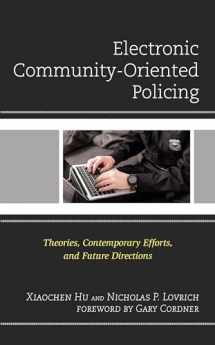
Electronic Community-Oriented Policing: Theories, Contemporary Efforts, and Future Directions (Policing Perspectives and Challenges in the Twenty-First Century)
Book details
Summary
Description
Review
This book’s main message is that police agencies can, through social media, manage their image, bolster their legitimacy with the public, and foster closer bonds with the communities they serve. They can do so by supplementing traditional community-oriented policing with what the authors call "electronic community-oriented policing," or E-COP. This provides greater opportunity for two-way police-public interactive communication that benefits both sides. While E-COP can be a tool in crime fighting, the authors focus more on identifying best practices the police can employ to communicate more effectively with the people they protect and serve. The authors predict that E-COP will become one of the main policing strategies worldwide. They base their suggestions for improving police use of social media on their own study, which analyzed Facebook posts published by US police departments. . . this book will be of interest to students, scholars, and practitioners in criminal justice and police studies. Summing Up: Recommended. Upper-division undergraduates. Graduate students, faculty, and professionals. ― Choice Reviews
As one who has been reading, writing, and researching Community-Oriented Policing since the late 1980s, I have seen it change over the years, moving from the innovation generation in the 1980s, to diffusion in the 1990s, and institutionalization in the 2000s, but had no way of conceptualizing modern Community-Oriented Policing; that is at least until now. Lovrich and Hu not only introduce the next generation in their appropriately titled book Electronic Community-Oriented Policing: Theories, Contemporary Efforts, and Future Directions, but they use a mixed-methods approach to demonstrate all the complexities of modern Community-Oriented Policing. If you are looking for a book to understand Community-Oriented Policing today, this is the book to read. -- Willard M. Oliver, Sam Houston State University
Police strategies around social media practices have emerged over much of the last decade yet there remain a limited number of studies that have examined police practices on social media. This book provides an exploratory study of one side of police use of social media by focusing largely on Facebook. Employing a multi-disciplinary perspective and mixed methods approach, Xiaochen Hu and Nicholas Lovrich provide important insights into some contemporary developments in virtual policing, or electronic community-oriented policing (E-COP). This timely book sets out agendas for police practices on social media and future research into E-COP, which will continue to develop and expand into a core policing strategy. This book will be of great interest to police practitioners at all levels, scholars as well as students in psychology, sociology, and mass communication, and the general public. -- Christopher J. Schneider, Brandon University, author of Policing and Social Media: Social Control in an Era of New Media
While social media have become a central topic in social inquiry, the implications of such communication channels for criminal justice have yet to be thoroughly explored. In this careful and rigorous study, Hu and Lovrich address this gap and offer an innovative account of police use of social media. They develop and deploy a concept – that of E-COP – to explore they ways that social media are impacting and reshaping community-oriented policing and public engagement with criminal justice and law enforcement. The resulting book offers an important new development in our understanding of criminal justice and new media, and promises to help guide the engagement of law enforcement actors with citizens in the digital age. It is highly recommended for students, scholars, practitioners and policy makers interested in the future of policing. -- Majid Yar, Lancaster University
In politics, culture, and personal interactions new media have become the dominant communication channels. Along with other institutions the polic


We would LOVE it if you could help us and other readers by reviewing the book
Book review



